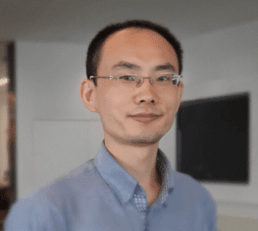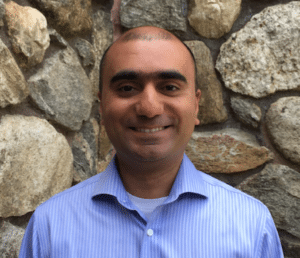Our interns did some great work on some very meaningful projects this summer. We’ve shared details of their work here. Of course, the program wouldn’t work without the time, effort and input our mentors provided. Many of them went the extra mile and provided their take on lessons learned, what they gained by being a mentor and advice for future interns as well. Here is some of the wisdom they shared:
Baohua Yang, Principal Architect, Oracle Blockchain (Project: Design Effective Operational Platform for Blockchain Management)

Lessons learned:
The intern’s self-motivation is important as is his/her interests with open-source projects.
What you got out of being a mentor:
I was very glad to help new person to get involved into the open-source world.
Advice for those interested in interning in the future:
Knowledge or skill is not the most important thing to learn as an intern. The Hyperledger internship is a great opportunity to help you learn open culture and principles to participant a teamwork.
Dave Huseby, Security Maven, Hyperledger, The Linux Foundation (Project: Simulating Hyperledger Networks with Shadow)

Lessons learned:
The primary lesson I learned is to choose the right size for an intern project. I was ambitious in what I asked my intern to do. It turns out that blockchains are complicated pieces of software and getting them to run under a simulator is difficult. That said, the reduced scope we agreed upon mid-summer was met and we did advance this effort. I’m hoping that an intern next summer will pick up where my intern left off.
What you got out of being a mentor:
It was interesting to see our community through the eyes of a newcomer. I got involved with open source communities so long ago that I forgot what it was like to be new. I had forgotten all of the mental shifts (e.g., don’t ask for permission, just do) and leaps of faith (e.g., here’s my code, please be nice) that a developer has to make to be a successful contributor to an open source project. It takes real courage to contribute code and fully participate in a community where you know nobody. I really enjoyed encouraging Martin when things got tough. More importantly, the best thing I got from being a mentor was a new friend. Martin is a really good person.
Advice for those interested in interning in the future
Be prepared to work hard. Working remotely is difficult and not a normal way of working. It takes a great deal of self-discipline, and as I said above, it takes real courage to submit code to people you don’t know and be judged by your contribution. Be prepared to learn. With the right attitude, an intern can get some real rubber-meets-the-road experience. There’s a big difference between a recent computer science graduate and a work-a-day programmer. An internship working on open source software can go along way towards making you a work-a-day programmer.
Jay Guo Software Engineer, IBM (Project: Extended Support for EVM and and Tooling in Hyperledger Fabric)

Lessons learned:
We should set realistic goals for interns, and we should give them enough time to climb the learning curve.
What you got out of being a mentor:
Mentoring requires more than technical skills. I learned a great deal of project management, communication and presentation skills
Advice for those interested in interning in the future:
- Remote internship is hard and timezone difference makes it even harder. Both mentors and applicants should take this into consideration. Being located in the same city would make life much easier.
- Communication is a key part of internship. Interns should proactively seek help from mentors, and this is a quality that mentors should pay attention to when interviewing candidates.
Swetha Repakula, Open Source Developer, IBM Digital Business Group (Project: Extended Support for EVM and and Tooling in Hyperledger Fabric)

Lessons learned:
- Most of my lessons comes from the fact that this was a remote internship. I underestimated the difficulty that comes from both not being able to work together in person as well as being able to finding a reasonable time for everyone involved to be able to speak. Because of this, I think projects that are suggested for this program either have to be very structured and scoped or the project needs to be isolated enough that the intern is able to make progress without other people. The solution to this we found was scheduling regular calls and asking for daily reports on progress to make she was on track.
- Another thing I learned was making sure our intern felt comfortable asking questions and not feeling like she was alone. Creating that environment was our number one goal because interns shouldn’t feel like they are expected to do everything by themselves. We found that explaining our expectations to her and constantly encouraging her to ask us questions was the best solution to this.
- My final takeaway was setting realistic goals for the internship. Goals can refer to the actual progress of the project, but I viewed the internship successful if our intern was able to end the program with a skill set she could apply to whatever she planned to do next. Of course our intern produced results, but what I was most proud of was when she understood concepts such as test-driven development or breaking down a project into smaller achievable tasks. Those are the skills that will make her a good developer and, in the end, the goal of this program is to enrich our interns, not necessarily just got some work done for our projects.
What you got out of being a mentor:
- I have always enjoyed sharing knowledge, and this program gave me the opportunity to do that. My proudest moment easily was when my intern spoke about how the things we taught her during the internship directly applied to her current classes. As I mentioned above, our first goal was to make sure our intern learned enough that she could apply it to the rest of her career.
- I found though that mentoring someone was not just about teaching but required some managerial skills. That would involve making sure my schedule allowed enough time for me to be available to guide my intern, ensuring she was making enough progress at the correct pace and helping her get the resources she needed to complete her work. This is was a very new experience from me.
Advice for those interested in interning in the future:
- I recommend that those who wish to intern in the future be honest, whether that is about their skill set, their availability, or their professional interests. Our intern was clear about what she understood or didn’t understand and that really helped make sure the limited time we had was focused on what she was stuck on.
- Be proud of your current accomplishments. As mentors we aren’t expecting you to necessarily have experience in the topics we are working on. What I look for is someone who is driven and passionate about the work they do. So be able to talk about those accomplishments, regardless of whether it is a class assignment or a huge project you have worked on.
- Communication is key for anything you work on. Focus on being to explain your ideas clearly as well as relaying what you have done in the past. And, lastly, come with your ideas and questions.
Sheehan Anderson, Vice President/Director of Architecture, State Street (Project: Hyperledger Fabric Chrome Extension)

Lessons learned:
Working remotely brings unique challenges, especially when starting a new project. There were several of steps we took that worked really well throughout the internship.
- Have a plan laid out on day one that covers the length of the internship. Understand what parts of the project should be functioning by the end of each week as 12 weeks will go by really quickly. You don’t want to be spending time deciding what to do at the start of each week.
- Communication is important. Have regular video conference calls to demo what has been built, discuss any blockers, make sure that next steps are understood, and just to get to know each other. Be available on Rocket.Chat (chat.hyperledger.org) so you can answer questions. Also, encourage your intern to reach out in the various channels when they have a question. It’s a great way to meet other Hyperledger developers.
- Be flexible. Chances are that your 12 week plan will encounter at least some roadblocks. Be quick to remove or alter features if they are taking longer than expected to build.
What you got out of being a mentor:
Hyperledger Fabric is no longer a new project. I started as one of the original developers and now spend most of my time writing applications that run on the Hyperledger Fabric platform. I’m surrounded by people with similar experience. Having a chance to work with someone who is both new to Hyperledger and early in their software engineering career brings new perspectives that are important. A risk of working on the same thing for too long is that you get used to the way things are and don’t stop and question why something is done in a particular way and if there may be a new or better alternative. Being a mentor requires you to both be able to explain the existing architecture and answer those “why” questions that you may have ignored otherwise.
Advice for those interested in interning in the future:
The interns that really stood out during the interview process had built projects utilizing existing open source projects. This showed that they had curiosity, determination, and the ability to self-learn and get unstuck when faced with an obstacle. Sometimes contributing to existing open source projects can seem daunting or have a very steep learning curve. Creating your own small project that makes use of an existing open source project can be a great introduction to various open source communities and will also show that you have the skills needed to succeed in a program like the Hyperledger internship.
Salman A. Baset, IBM (Project – Running Solidity Smart Contracts on Hyperledger Fabric or Vice Versa)

1) Lessons learned:
To have a successful internship outcome, a project needs to be crisply defined, have an intern who possesses the necessary background and is excited to learn, and have periodic sync ups with the intern. I was fortunate to have an intern who had background in compilers and was excited to learn both Ethereum and Hyperledger Fabric in order to translate Solidity smart contracts into Javascript for Fabric. We leveraged Zoom and Hyperledger Rocket chat for communication.
The key takeaway from the project is that it is possible to write smart contracts for one platform that run in another without making changes to the core platform. Perhaps, a bigger lesson is that there is a need to write smart contracts in a language that can be run on any target platform (similar to Java). Hopefully, next year, we can have a project to develop a smart language that targets multiple blockchain platforms within Hyperledger.
The project is available as open source with Apache 2.0 license and will soon be converted to a Hyperledger Lab. The source code is available here:
https://github.com/AhmadZafarITU/SolidityToJavascriptTranslatorCode
What you got out of being a mentor:
I had the satisfaction of supervising a hardworking intern who was able to create running code for the seemingly difficult idea of running Solidity contracts on Fabric. My hope is that the project does not end with the culmination of the internship and sparks interest among other members of the community.
Advice for those interested in interning in the future:
Asking questions to your mentor and seeking solutions on your own from members of community is very important.
We would also like to recognize the mentors for all the time, effort and input they provided! As always, you can keep up with what’s new with Hyperledger on Twitter or email us with any questions: info@hyperledger.org.
Sign up for Hyperledger Horizon & /dev/weekly newsletters
By signing up, you acknowledge that your information is subject to The Linux Foundation's Privacy Policy